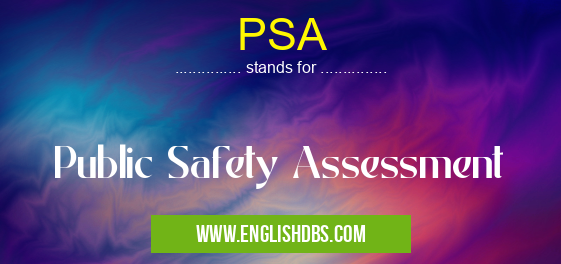What does PSA mean in LEGISLATION
PSA stands for Public Safety Assessment. It is a risk assessment tool used to predict the likelihood that a person will re-offend. The PSA is used by law enforcement and the courts to make decisions about bail, sentencing, and parole.

PSA meaning in Legislation in Governmental
PSA mostly used in an acronym Legislation in Category Governmental that means Public Safety Assessment
Shorthand: PSA,
Full Form: Public Safety Assessment
For more information of "Public Safety Assessment", see the section below.
What is the PSA?
The PSA is a computer-generated assessment that uses a variety of factors to predict the likelihood of recidivism. These factors include:
- Criminal history: The type and severity of past offenses, as well as the number of times the person has been arrested and convicted.
- Demographics: The person's age, race, gender, and education level.
- Social and environmental factors: The person's family situation, employment history, and substance abuse problems.
The PSA is designed to be objective and fair. It does not consider race, gender, or other protected characteristics.
How is the PSA used?
The PSA is used by law enforcement and the courts to make decisions about bail, sentencing, and parole. In some jurisdictions, the PSA is used to determine whether a person is eligible for pretrial release. In other jurisdictions, the PSA is used to set bail amounts and to determine sentencing guidelines. The PSA can also be used to determine whether a person is eligible for parole.
Essential Questions and Answers on Public Safety Assessment in "GOVERNMENTAL»LEGISLATION"
What is a Public Safety Assessment (PSA)?
A PSA is a risk assessment tool used to predict the likelihood of an individual re-offending after release from jail or prison. It considers factors such as criminal history, age, and education to determine the risk level.
How is a PSA different from a traditional bail assessment?
Traditional bail assessments focus solely on the current charges and the defendant's flight risk. PSAs, on the other hand, consider a wider range of factors, including an individual's past behavior and future risk of harm.
What are the benefits of using PSAs?
PSAs aim to ensure that individuals are treated fairly and in a way that is proportionate to their risk level. This can lead to reduced pretrial detention and improved outcomes for both the individual and the community.
Are PSAs always accurate?
No assessment tool is perfect. PSAs are designed to be as predictive as possible, but they cannot guarantee the future behavior of an individual. Other factors, such as access to housing and employment, can also influence recidivism.
How are PSAs used in the justice system?
PSAs are typically used in pretrial and sentencing decisions. They can inform decisions about release and detention, as well as the appropriate level of supervision and support for individuals after conviction.
Final Words: The PSA is a valuable tool that can help law enforcement and the courts to make more informed decisions about bail, sentencing, and parole. The PSA is objective and fair, and it can help to ensure that people are treated fairly and that the community is protected.
PSA also stands for: |
|
| All stands for PSA |
